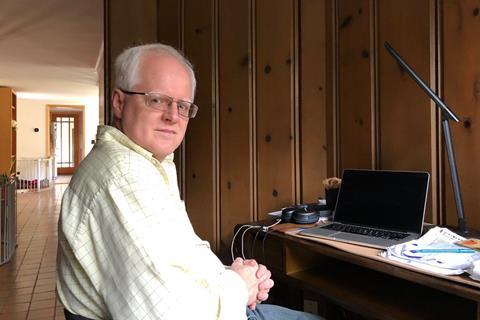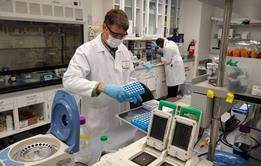The chair of NYU’s chemistry department says research is ‘completely interrupted’ in his lab and his senior graduate student is stuck in China
During this difficult time, Chemistry World is checking in with chemists around the globe to see how they are weathering the Covid-19 pandemic.

Organic chemist James Canary has chaired New York University’s (NYU) chemistry department, made up of approximately 24 tenure track faculty, 17 contract faculty and 160 researchers, for about six years. Canary also runs a research lab at the university, where he and four graduate students design, synthesise and study molecular switches of various types. But everything changed in mid-March after Covid-19 struck New York, and Canary hasn’t been back to his lab since.
The first step was when NYU moved to remote instruction in mid-March. The university’s labs remained operational for several days after that switch, but then leadership decided that all research should be done remotely, when possible. ‘Then, when the governor said that all non-essential workers should stay home, that was the moment when we formally told everybody that they needed to stay at home,’ Canary recalls.
‘The labs are closed now, with the exception of critical activities,’ such as lab safety and maintenance or research related to Covid-19, Canary says. ‘In my lab, our experiments have been completely interrupted,’ he adds.
The most senior student his lab went home to China in January to visit his mother over the Chinese New Year, and he has been stuck there ever since. His entry visa back to the US was delayed, and the virus exploded in China while he was waiting on the paperwork. ‘Then, the US shut off the opportunity for people from China to come here, so he’s still over there,’ Canary recounts.
Enjoying being non-essential
The stranded graduate student has been working remotely with Canary on research papers and grant proposals, and the department is trying to secure temporary lab space for him, anticipating that the visa will take some time. NYU has a campus in Shanghai that partially reopened on 27 April, and Canary says that is one possible interim solution.
The only researchers allowed in NYU labs are those who need to access it for safety reasons or to maintain resources that require regular upkeep, like cell cultures and sensitive instrumentation. There are also some researchers there because they are working in areas related to Covid-19 and are therefore considered ‘essential’. Canary estimates that at most 20 researchers in NYU chemistry labs are working on such projects.
‘I enjoyed the day when I realised that I was non-essential,’ Canary says, noting that his job only requires his computer. ‘It has been easy for me to work remotely, and it has also been easy for the scientists that use primarily computational tools,’ he adds. ‘They are able to continue to do their research with those tools, although they are badly missing the in-person interaction that they need to keep moving smoothly in their research.’
Things are more difficult, however, for the experimentalists in the department. ‘They are doing what they can, with reading and writing at home, perhaps using more computational tools than they normally would,’ Canary says. With people locked out of the lab, there’s been a lot more research manuscript and proposal writing, and he has seen an uptick in requests to review papers.
Community support
So far, Canary’s life in lockdown is alright. He is hunkered down with his wife – a physician who administers a New York City health department programme for children born prematurely who have special needs – and his 29-year-old son who works at the 9/11 memorial museum. They live in the northern suburbs of New York City, where social distancing and large, open outdoor areas are plentiful, unlike in the city.
Canary keeps in touch with his team members and colleagues regularly through email, Zoom and other electronic means like Slack. In early April there was a shortage of personal protective equipment at New York City hospitals, while admissions and seriously ill patients were skyrocketing. Canary and his colleagues collected items from their labs like gloves, masks and disposable lab coats, and donated them to local hospitals.
Canary keeps stress at bay by exercising, doing yard work and volunteering with his church – reaching out to people who don’t have smartphones or computers so might feel disconnected and need help. He also has more time to read. ‘I always have the opportunity to read articles in my field during the course of our research activities, but to be able to browse the table of contents of the top chemistry journals and look at any article has been hard for me while I have been chair of the department,’ Canary explains.
Chemists amid coronavirus

How chemists around the world are coping with life and work during the Covid-19 pandemic
- 1
- 2
- 3
- 4
- 5
- 6
- 7
- 8
- 9
- 10
- 11
- 12
- 13
- 14
- 15
- 16
 Currently
reading
Currently
reading
Chemists amid coronavirus: James Canary
- 18
- 19
- 20
- 21
- 22
- 23
- 24
- 25
- 26
- 27
- 28
- 29
- 30
- 31
- 32
- 33
- 34
- 35
- 36
- 37
- 38
- 39
- 40



























































































No comments yet